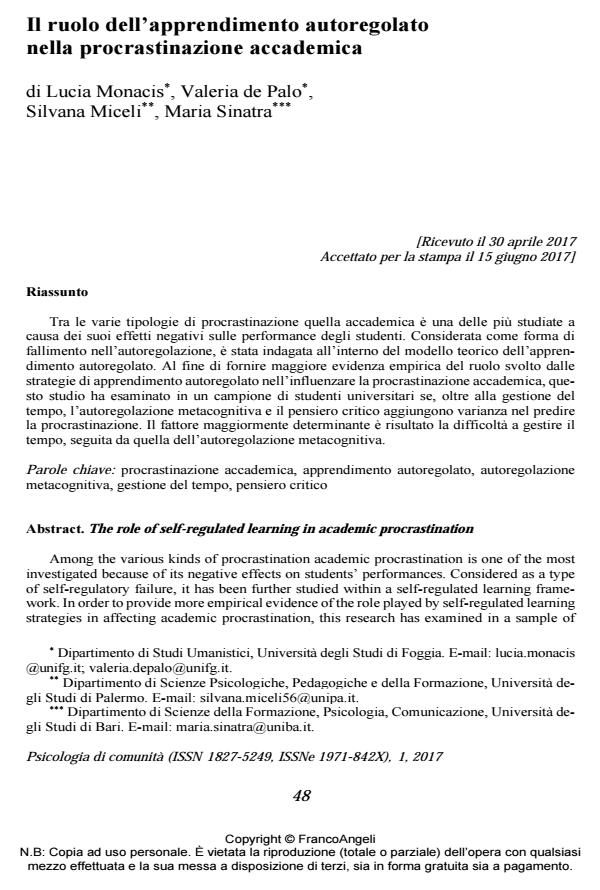Il ruolo dell’apprendimento autoregolato nella procrastinazione accademica
Titolo Rivista PSICOLOGIA DI COMUNITA’
Autori/Curatori Lucia Monacis, Valeria de Palo, Silvana Miceli, Maria Sinatra
Anno di pubblicazione 2017 Fascicolo 2017/1
Lingua Italiano Numero pagine 9 P. 48-56 Dimensione file 191 KB
DOI 10.3280/PSC2017-001005
Il DOI è il codice a barre della proprietà intellettuale: per saperne di più
clicca qui
Qui sotto puoi vedere in anteprima la prima pagina di questo articolo.
Se questo articolo ti interessa, lo puoi acquistare (e scaricare in formato pdf) seguendo le facili indicazioni per acquistare il download credit. Acquista Download Credits per scaricare questo Articolo in formato PDF

FrancoAngeli è membro della Publishers International Linking Association, Inc (PILA)associazione indipendente e non profit per facilitare (attraverso i servizi tecnologici implementati da CrossRef.org) l’accesso degli studiosi ai contenuti digitali nelle pubblicazioni professionali e scientifiche
Tra le varie tipologie di procrastinazione quella accademica è una delle più studiate a causa dei suoi effetti negativi sulle performance degli studenti. Considerata come forma di fallimento nell’autoregolazione, è stata indagata all’interno del modello teorico dell’apprendimento autoregolato. Al fine di fornire maggiore evidenza empirica del ruolo svolto dalle strategie di apprendimento autoregolato nell’influenzare la procrastinazione accademica, questo studio ha esaminato in un campione di studenti universitari se, oltre alla gestione del tempo, l’autoregolazione metacognitiva e il pensiero critico aggiungono varianza nel predire la procrastinazione. Il fattore maggiormente determinante è risultato la difficoltà a gestire il tempo, seguita da quella dell’autoregolazione metacognitiva.
Parole chiave:Procrastinazione accademica, apprendimento autoregolato, autoregolazione metacognitiva, gestione del tempo, pensiero critico
Lucia Monacis, Valeria de Palo, Silvana Miceli, Maria Sinatra, Il ruolo dell’apprendimento autoregolato nella procrastinazione accademica in "PSICOLOGIA DI COMUNITA’" 1/2017, pp 48-56, DOI: 10.3280/PSC2017-001005